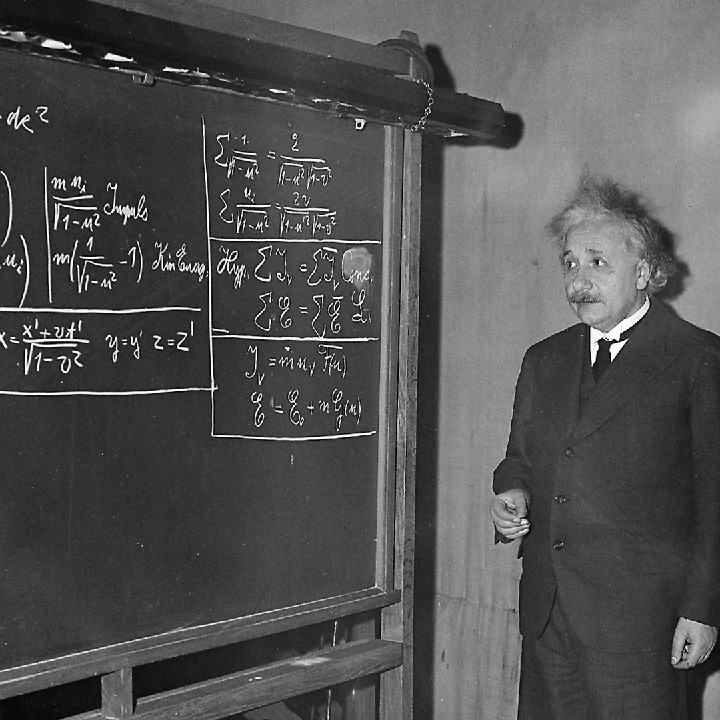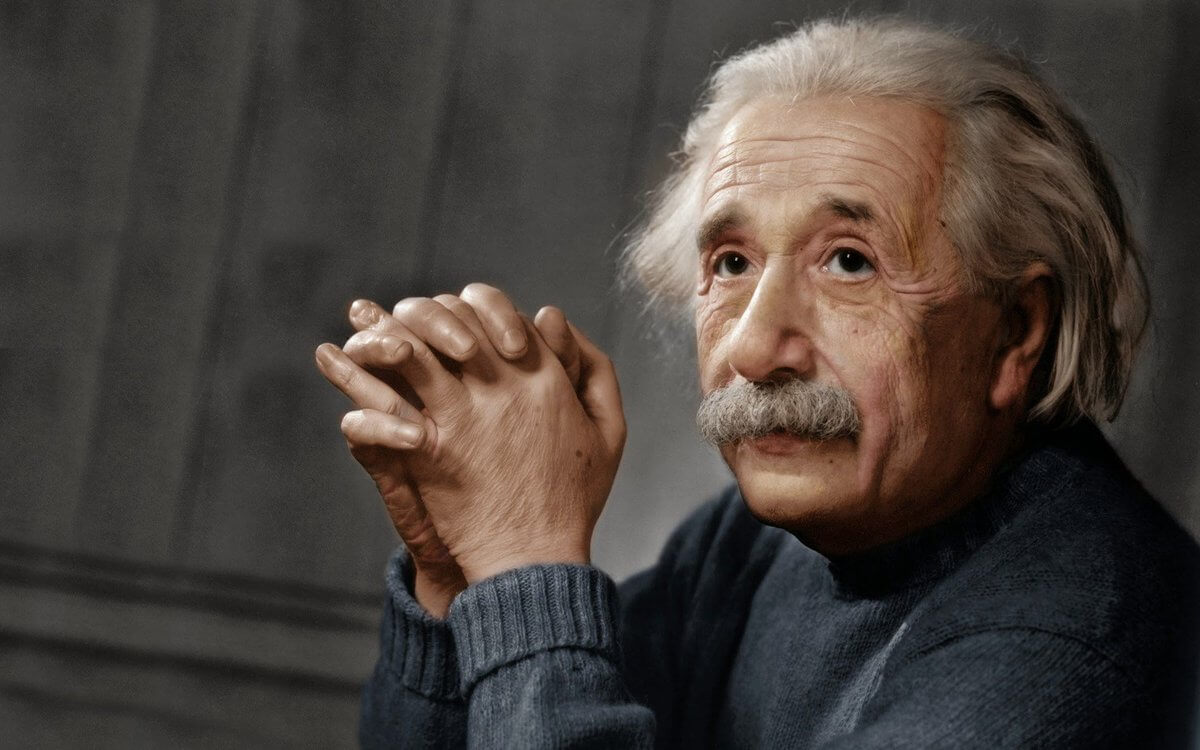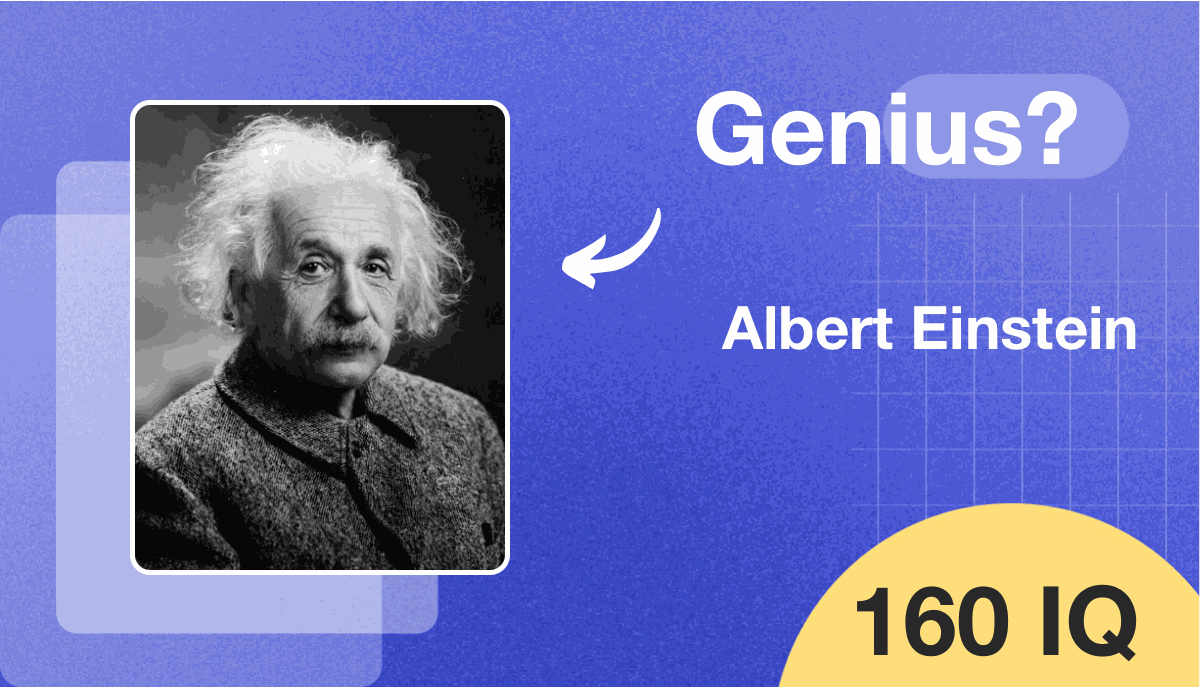Have you ever wondered about the true measure of a genius, especially when it comes to someone as brilliant as Albert Einstein? It's a question that, you know, pops up a lot when people talk about incredibly smart individuals. For many, the idea of an IQ score helps to put a number on just how intelligent someone might be, and so, naturally, folks often ask: "What is Einstein's IQ?" It's a fascinating thought, really, trying to quantify the mind that gave us so much, isn't it?
Yet, the truth about Albert Einstein's IQ isn't as straightforward as you might think. There's a bit of a puzzle to solve, you see, because the way we measure intelligence today wasn't quite the same back in his time. So, while we might be curious to pinpoint an exact number, the reality is a little more, well, open to discussion.
This article will explore the popular estimates and the reasons why pinning down a precise IQ for Albert Einstein is, in a way, quite a challenge. We'll look at what the experts generally say and why this iconic figure's intelligence continues to be a subject of such widespread interest, even today. It's almost like, we want to understand the scale of his brilliance, and an IQ number seems like a good starting point, doesn't it?
Table of Contents
- Einstein: A Brief Look at His Life
- The IQ Question and Einstein's Mind
- Frequently Asked Questions About Einstein's IQ
Einstein: A Brief Look at His Life
Albert Einstein, as a matter of fact, was born in 1879. His birthplace was Ulm, which is in the Kingdom of Württemberg, part of Germany. This man, you know, would later become famously known as a scientific luminary, someone who truly changed how we see the world. His early life, like, set the stage for the incredible achievements that were to come.
It's interesting to consider that the very place he started his life would, in a way, contribute to the person he became. His journey from a small German town to a global icon of intellect is, well, quite something. The influence of his early years, though not detailed here, certainly played a part in shaping his unique way of thinking, wouldn't you say?
Personal Details and Bio Data
| Detail | Information |
|---|---|
| Full Name | Albert Einstein |
| Born In | Ulm, Kingdom of Württemberg, Germany |
| Birth Year | 1879 |
The IQ Question and Einstein's Mind
So, what is Albert Einstein's IQ? This is a question that, you know, comes up a lot when we talk about him. People are often very curious about putting a number to his incredible intellect. It's a natural thing to wonder, especially when someone has made such profound contributions to science and our understanding of the universe. We want to grasp the scale of his cognitive abilities, don't we?
However, the simple answer is that Albert Einstein's IQ remains a subject of speculation. There's no verified record that he ever took a formal IQ test, which means any number you hear is, in some respects, an estimate. It's almost like trying to guess the exact height of a mountain when you only have distant photos; you can get a good idea, but not a precise measurement.
The problem is, nobody really can say for sure what Einstein’s IQ was. There wasn't a proper test to measure his IQ during his lifetime in the way we understand standardized tests today. This lack of a direct measurement leaves us relying on other methods to try and figure out his intellectual capacity, which is, well, quite fascinating in itself.
Why No Definite IQ Score?
The main reason we don't have a definite IQ score for Albert Einstein is quite simple, actually: he never took an IQ test. There’s no indication, you know, that he ever was tested. This is a crucial point because, without that direct measurement, any number assigned to him is, by its very nature, an estimation rather than a confirmed score.
You see, IQ testing was still in its early stages in the early 1900s, which is when he emerged as a scientific luminary. The methods and standardized tests we use today simply weren't available or widely practiced in the same way back then. So, it's not like he avoided taking a test; the opportunity just wasn't there in a formal, widely recognized sense, or at least, there's no record of it.
Because he never took any kind of test to measure his intelligence, the definite score is still a mystery. This means that Albert Einstein's IQ level remains speculative. We can only rely on what experts have pieced together through other means, which is a bit like being a detective trying to solve a case with indirect evidence, isn't it?
His IQ remains a subject of speculation since he never took an IQ test. This point is worth repeating, as it's the core reason for the ongoing discussion. It’s not that people don’t want to know; it’s that the data just isn’t there in a straightforward way. So, any number you hear is, you know, a very educated guess.
Estimated IQ Scores: What the Experts Suggest
Despite the lack of a formal test, experts have taken it upon themselves to analyze his IQ. Based on historical records and his undeniable achievements, they've made some very educated guesses. According to some sources, Einstein’s IQ was probably about 160, which is commonly considered genius level. This number is largely derived from his achievements in physics, especially his groundbreaking papers published in 1905, which, you know, laid many foundations for modern science.
According to estimates by means of biographical data, Albert Einstein’s IQ has been estimated to sit anywhere between 160 and 180. That would firmly place the physicist in the genius territory, no doubt about it. It's interesting how they arrive at these numbers, often by looking at the complexity of his thoughts and the originality of his work. This range, like, gives us a good idea of his intellectual standing.
Albert Einstein’s IQ number is estimated to be around 160, which is well above the average IQ and places him firmly in the genius rank. However, we should note that Einstein never actually took an IQ test, so we can rely only on these careful estimations. It's a bit like measuring the impact of a meteorite by the size of the crater it leaves, rather than catching it in mid-air.
News articles often put Einstein’s IQ at 160, though it’s unclear what that estimate is based upon, beyond his general brilliance. This widely cited number, you know, has become almost synonymous with his name when people discuss intelligence. It's a convenient shorthand for his extraordinary mental capacity, even if it's not a verified score.
Some IQ tester specialists have said his IQ was exceptionally high, somewhere between 160 and 180. These are the people who study intelligence for a living, so their estimations carry some weight. And then, you know, some people even say his IQ was reportedly slightly over 200, which is an even higher estimate, pushing him into truly rare air.
Based on historical records, Einstein's estimated IQ is around 160. This estimation is based on historical analysis and scientific principles, trying to reverse-engineer what kind of intellect would be needed to conceive of theories like relativity. It's a fascinating exercise in intellectual detective work, really, trying to quantify the unquantifiable in a way.
Experts have taken it upon themselves to analyze his IQ, and as per such postulations, his IQ is approximately between 160 and 190, which lies within the typical range for such estimates. This range, like, suggests a consensus among those who study intelligence that he was, without a doubt, a truly exceptional thinker. It's pretty clear, then, that he was operating at a very high cognitive level.
What Does An IQ of 160 (or More) Really Mean?
IQ represents overall cognitive abilities. On the normed scale where 100 IQ represents average intelligence (adjusted for age), Einstein‘s 160 score places him in the 99.9th percentile of human brainpower. That means, you know, out of a thousand people, he would be smarter than 999 of them. That's a pretty staggering thought, isn't it?
On average, the typical person can score somewhere between 85 and 110, says Science Trends. Anything above 130 is considered a high IQ, and a score under 70 is considered, well, below average. So, an estimated IQ of 160 puts Einstein far, far beyond what is considered just "high IQ"; it places him squarely in the genius category. It's a truly remarkable level of intellectual capacity.
A score of 135 or above puts a person in the 99th percentile of the population. So, an estimated 160 is, like, even more impressive than that. It’s not just being in the top 1%; it’s being in the top sliver of that top 1%. This level of intelligence is incredibly rare, and it's what allows for truly revolutionary thinking, you know, the kind that reshapes entire fields of study.
To put it in perspective, Albert Einstein's IQ is widely estimated to be around 160, placing him in the top 1% of the global population. This isn't just a little bit smart; it's profoundly intelligent. It means his brain was wired in a way that allowed him to see connections and solve problems that most people couldn't even begin to grasp. It's a very special kind of mind, indeed.
For comparison, you might recall Marilyn vos Savant, who in 1986, gained widespread fame when she entered the Guinness World Record category for the “highest IQ,” with her IQ recorded at 228. She held that record until 1989. While her score was significantly higher than Einstein's estimate, it helps to illustrate the range of what's considered incredibly high IQ. It shows that, you know, there are different levels even within the genius category.
So, while we may not have a definitive number for Albert Einstein's IQ, the consistent estimations of 160 to 180, and even up to 190 or over 200, clearly show that he possessed an extraordinary mind. His ability to revolutionize physics speaks volumes about his cognitive power, far more than any single test score ever could. It's pretty clear that his brain was operating on a different level, wouldn't you say?
Learn more about intelligence and cognitive abilities on our site, and link to this page to understand more about the history of IQ testing.
Frequently Asked Questions About Einstein's IQ
Here are some common questions people ask about Albert Einstein's intelligence.
Did Einstein ever take an IQ test?
No, there is no verified record that Albert Einstein ever took a formal IQ test. IQ testing was still in its early stages when he became a prominent scientist, so he simply wasn't tested in the way we might expect today. His intelligence is, you know, measured by his incredible achievements rather than a test score.
What was Einstein's estimated IQ?
Based on historical analysis and his scientific contributions, Albert Einstein's IQ is widely estimated to be around 160. Some experts suggest a range between 160 and 180, or even up to 190. A few even speculate it was slightly over 200. These numbers are, like, derived from the sheer brilliance of his work, not a direct test.
What does an IQ score of 160 mean?
An IQ score of 160 is considered to be in the "genius" range. On a normed scale where 100 is average, a 160 places a person in the 99.9th percentile of human brainpower. This means someone with an IQ of 160 is, you know, more intelligent than 99.9% of the population, indicating exceptionally high cognitive abilities.



Detail Author:
- Name : Domingo Leuschke
- Username : swaniawski.raven
- Email : janae20@hotmail.com
- Birthdate : 2004-06-09
- Address : 44003 Lang Ports Rozellamouth, MT 68891-1898
- Phone : 509.626.8714
- Company : Towne LLC
- Job : Secretary
- Bio : Est rem distinctio harum omnis veritatis omnis rerum. Ratione mollitia aut molestiae laboriosam. Mollitia eos laudantium vel. Fugit saepe voluptate culpa ut.
Socials
facebook:
- url : https://facebook.com/torrey.legros
- username : torrey.legros
- bio : Omnis harum blanditiis vel eligendi.
- followers : 4754
- following : 1774
linkedin:
- url : https://linkedin.com/in/tlegros
- username : tlegros
- bio : Enim sunt cum sed velit tempora harum error.
- followers : 250
- following : 577
tiktok:
- url : https://tiktok.com/@legros1986
- username : legros1986
- bio : Enim iure aliquam quia odio dolores dolore quis.
- followers : 6066
- following : 1242

